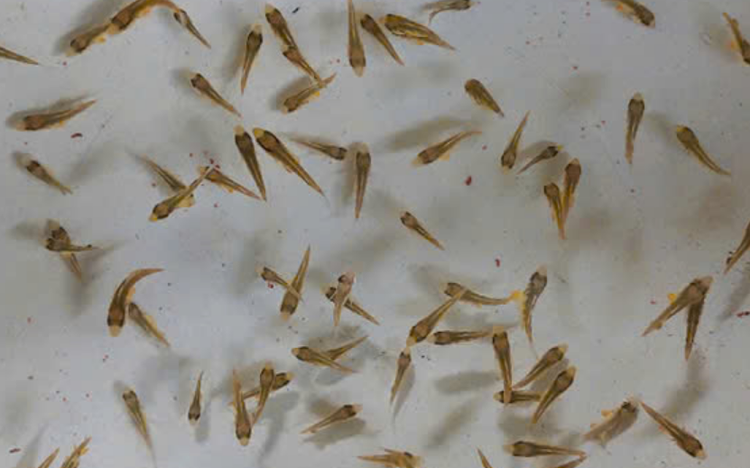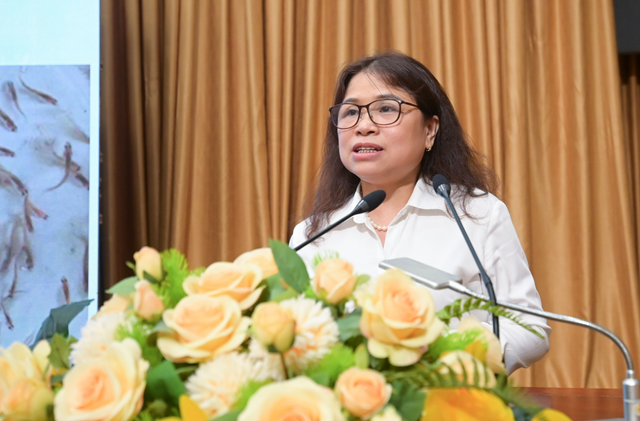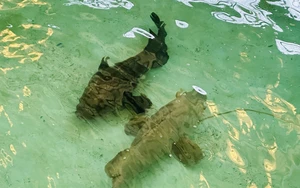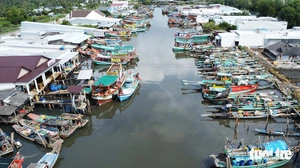
20-day-old amberjack. Photo: Dang Lua
The announcement was made by Associate Professor Dr. Dang Thi Lua, head of the Research Institute for Aquaculture No. 1, during a specialized session on animal husbandry, veterinary medicine, aquaculture, and fisheries inspection held on Saturday.
The event was part of a national conference organized by the Ministry of Agriculture and Environment to implement Resolution No. 57 of the Politburo on science, technology, innovation, and digital transformation.
Dr. Lua revealed that the institute recently succeeded for the first time in breeding amberjack in captivity.
This species is highly sought after in Japan, where it is a premium choice for dishes like sashimi and sushi.

Associate Professor Dr. Dang Thi Lua. Photo: Tung Dinh
With a market value of approximately VND1 million (US$38.5) per kilogram, amberjack is a cornerstone of Japan’s aquaculture industry, accounting for more than 50 percent of its farmed marine output.
Japan is the largest amberjack farming country in the world, producing about 150,000 metric tons of amberjack annually.
Amberjack is also farmed in Chile and Mexico.
Demand for the fish is growing in South Korea, the United States, and Europe.
Vietnam’s journey with amberjack began in 1991 with experimental farming at Nam Beach on Son Tra Peninsula in Da Nang, the capital city of central Vietnam, using wild-caught fries.
However, this model was unsustainable due to the dwindling supply of wild juveniles.
The recent breakthrough came as researchers observed that amberjack fry started accepting artificial feed from the 18th day of rearing, a crucial stage in the breeding process.
This shift from natural to formulated feed is considered a key technical hurdle in successful aquaculture.
The current stock of the fry is now 23 days old.
“This is the first time in the world that amberjack breeding has been successfully carried out, and it was done in Vietnam,” Dr. Lua confirmed.
The fish will now be raised to juvenile stage for future commercial farming trials.
Dr. Lua also noted that while countries like Japan and China have been investing heavily in artificial breeding programs for amberjack, they have not yet achieved success, making Vietnam’s accomplishment all the more significant.
In addition to amberjack, the institute has also successfully bred fourfinger threadfin, another valuable species with potential for large-scale aquaculture.
While pilot models for fourfinger threadfin farming have been implemented, commercial-scale operations remain limited due to the need for refined production technology.
To turn both species into mainstays of Vietnam’s aquaculture, Dr. Lua proposed further investment in research to optimize breeding and farming techniques suited to local conditions.
For fourfinger threadfin in particular, she emphasized the need to develop technologies that allow multiple spawning cycles per year and specialized feed that could shorten the grow-out period and improve feed conversion ratios.
She also recommended launching a national program to develop fourfinger threadfin farming at a commercial scale for export, involving a network of enterprises.
Tran Dinh Luan, head of the Directorate of Fisheries, affirmed the directorate would continue to focus on long-term scientific programs to breed fast-growing, disease-resistant aquatic species that can adapt to climate change.
Further research into aquaculture epidemiology and national product strategies for key species like brackish water shrimp and pangasius is also underway, with the potential addition of new marine species to Vietnam’s aquaculture portfolio.




Max: 1500 characters
There are no comments yet. Be the first to comment.